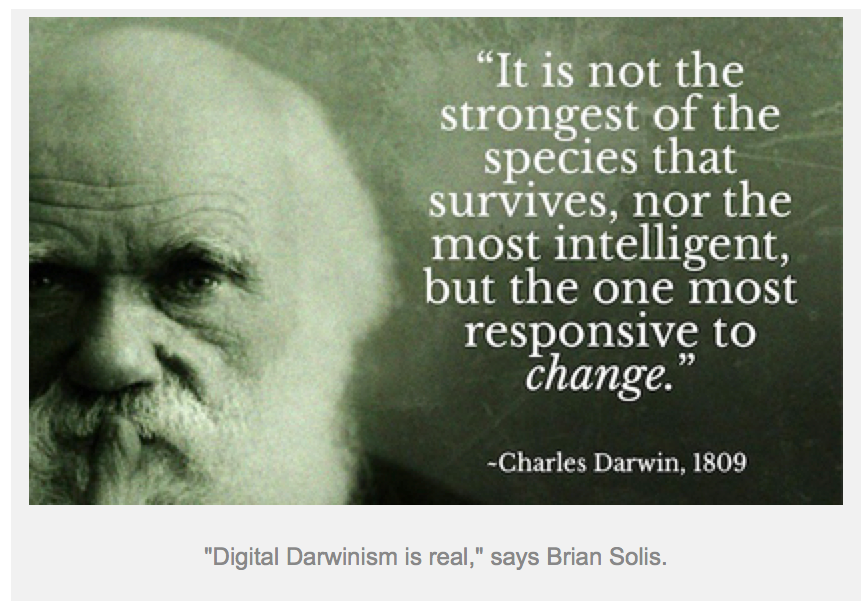PRNews recently interviewed Brian Solis to discuss WTF and his upcoming keynote at the 20/20 Summit in SF…
San Francisco is the urban epicenter of the ongoing digital revolution, with its proximity to Silicon Valley, bottomless start-up venture capital and polarizing corporate transportation services. So it’s the ideal spot for PR News’ Social Media 20/20 Summit on Aug. 12, where PR and marketing pros will gather to arm themselves, each other and their brands for the battles ahead over visibility, relevance and profit in the digital ecosphere.
And the ideal keynote speaker for the Summit is none other than Brian Solis, principal analyst for the Altimeter Group, futurist and author whose latest book tackles the very future of business and is called, appropriately enough, “What’s the Future of Business?: Changing the Way Businesses Create Experiences.” Solis intends to stir things up at the Westin San Francisco in a wide-ranging conversation with PR News about the dangerous professional risks PR pros and marketers are taking by proceeding with business as usual.
We began the conversational volley early and offer a preview of what’s to come on Aug. 12.
To begin, digital Darwinism is real says Solis.
PR News: In your book “What’s the Future of Business?” you suggest that while it’s a good thing that companies are investing more resources in managing their online reputations, the cost can be immense and the efforts are rarely aligned with customer expectations. What are many companies getting wrong in their engagement with customers and stakeholders?
Brian Solis: Companies are still bringing a dictator-like approach to engagement. They’re still broadcasting communications. It’s still “we speak, you listen.” Public relations, marketing and social media teams still try to own the conversation rather than invest in it, shape it or become part of it. It’s almost as if we put the “me” in social media and not the “we” in the social web. This is about relationships and people, not about marketing, sales or corporate communications. The more we remember that we are part of the networks as human beings, the more we can act as human beings and not as corporate functions.
PR News: If, as you have written, businesses should shift their engagement from being reactive online to creating positive experiences, what should PR and marketing professionals do to lead that shift internally, given that they don’t always have a seat at the table with senior management?
Solis: The element that’s missing the most is that of empathy and understanding. Most PR pros and marketers act without understanding or build without knowing what the complete experience is of their brand as it exists today. They just keep shoveling new and creative campaigns and material into this fire for fear that the fire would burn out otherwise. Without knowing what that experience is right now we can’t honestly know what needs to be fixed or have a vision of what that experience should be. And that’s what all of this change is about—it’s about becoming experience architects and using technology, creativity and empathy to build better experiences and relationships.
When PR and marketing pros have empathy with their audience they’ll have confidence, and when they have confidence they can create a sense of urgency and opportunity with senior leaders around the need to change. Executives have a hard time appreciating what needs to change because they don’t live their brand the way their customers do, and if they don’t live it they can’t understand why adapting to evolving audience expectations is so important.
PR News: You point out that the way people connect and communicate has changed, and only those organizations that can adapt to these changes will survive. Taking that to the personal level, what must professional communicators do to survive and thrive?
Solis: Digital Darwinism is very real. And it supposes that technology and society evolves with or without us. Unfortunately, I see many PR pros and marketers trying to take their prior experience and apply it to this digital world. The future of our careers and our role in both the revolution and evolution is to start with an open mind to see what’s different, to see how things have changed. And then develop strategies that move us in new directions. Much of what’s taking place today evokes common psychological responses such as denial, skepticism and derision. Unfortunately that gets in our way of seeing where we can learn and change in a world that is changing before us.
PR News: What is one takeaway you want Social Media 20/20 Summit attendees to bring back to their daily tasks?
Solis: I’m reminded of a Tolstoy quote: “Everyone thinks of changing the world, but no one thinks of changing himself.” What I want people to take back is to realize that they can’t sit and wait for someone to show them the path forward. This is a time where the people in that room in San Francisco and the people reading this now have to realize that change happens because of them—because of what they’re going to do to change the future right now.
The sooner people realize that they are the change agents, the faster change comes.
Brian Solis will keynote PR News’ Social Media 20/20 Summit in San Francisco on Aug. 12.
Follow Brian Solis: @briansolis
Follow Steve Goldstein: @SGoldsteinAI


![While AI learns and gets smarter and smarter, I spend my time preparing for the future by… [fill in the blank].
The most important skills of the future are human…
#creativity, #imagination, #individuality, #criticalthinking, #empathy
bit.ly/LifescaleBook 💫
Artist: @asiersanznieto
#promptengineering #prompting #ai #genai #artificialintelligence #keynotespeaker #motivationalspeaker #motivational #motivation #education #learning #leadership #leader](https://briansolis.com/wp-content/plugins/instagram-feed/img/placeholder.png)
Leave a Reply